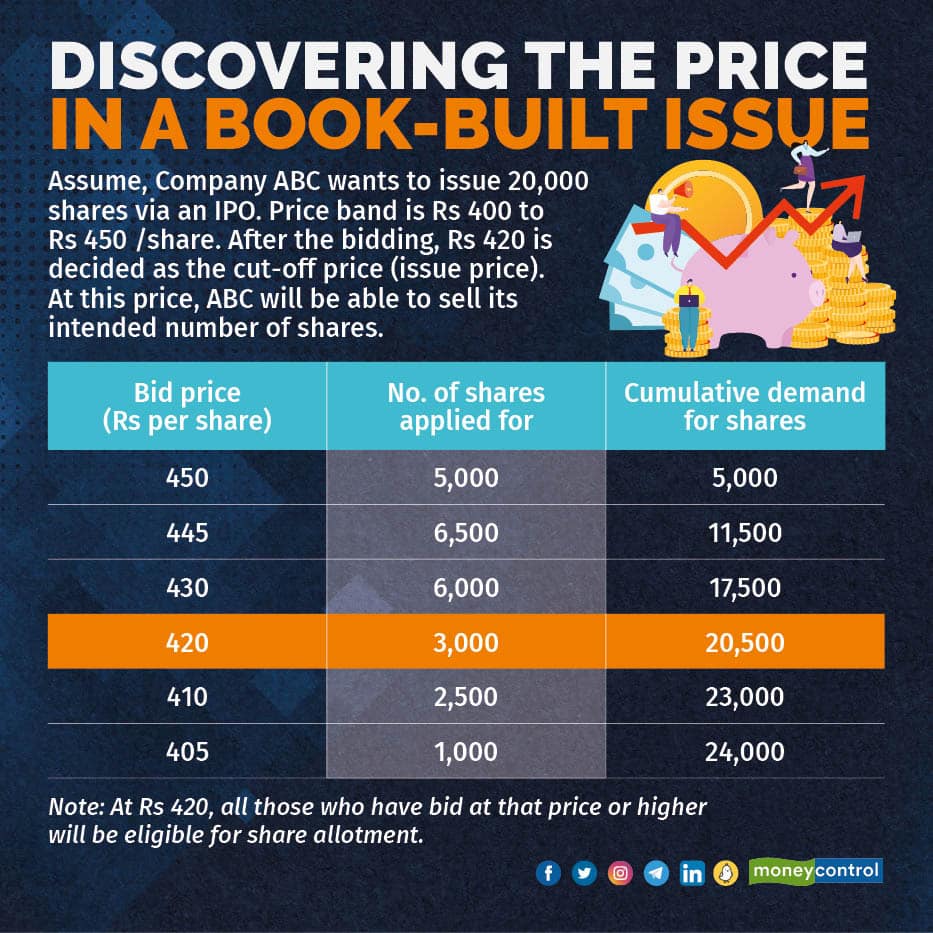



With the stock market on the rise, initial public offering (IPO) activity, too, has gathered pace. As many as 15 companies (including those on the exchanges’ SME platforms) have debuted on the bourses so far in July.
With an issue size of Rs 631 crore, the recently concluded IPO of Netweb Technologies, a computing solutions company, was the largest. But the Rs 4,326-crore Mankind Pharma IPO has been by far the biggest public issue this year, followed by a long tail of smaller ones.
Among the recently listed companies, Cyient DLM, a design-led manufacturing solution company; Ideaforge Tech, a drone manufacturer; and Utkarsh Small Finance Bank are the relatively larger ones.
And going by the draft offer documents filed with SEBI, more IPOs are in the offing.
Here are a few terms you should know this IPO season.
Fixed price versus book-built issue: In a fixed price issue, the company decides in advance the price at which shares will be issued to investors in the IPO. For instance, AccelerateBS India, a technology company that was recently listed on the BSE SME (small and medium enterprise) exchange, had announced a fixed issue price of Rs 90 per share.
But most (non-SME) companies listing on the BSE or NSE mainboard opt for a book-built issue these days. Under this, the company coming out with an IPO announces a price band rather than a fixed price. The issue price is then decided based on the bidding for these shares at prices within this range.
For example, Cyient DLM had announced an IPO price band of Rs 250-265 per share. Based on the price bids received for the shares, the company arrived at an issue price of Rs 265 per share. Likewise Senco Gold, a jewellery retailer had announced a price band of Rs 301-317. The company finally issued the shares at Rs 317.
In a book-built issue, investors submit their bids — indicating the number of shares and the price at which they would like to buy them. Once the bidding is over, the highest price bid at which the cumulative demand for shares matches the total shares on offer becomes the cut-off price. This is the price at which the shares are finally issued.
So, how does a company arrive at the cut-off/issue price in a book-built issue?
Here’s an example. Let’s say Company ABC wants to issue 20,000 shares through an IPO and it sets a price band of Rs 400-450 per share (see table). The bidding results show that at a price of Rs 420 per share, the company has sufficient demand (5,000 + 6,500 + 6,000 + 3,000 = 20,500 shares) to sell its intended 20,000 shares. So, the cut-off/issue price will be fixed at Rs 420.

All applicants whose price bids equal or exceed Rs 420 are eligible for allotment. But they will not get full allotment given the excess demand.
Offer for sale versus fresh issue: When a company decides to raise public money, it can do this in the form of a fresh issue or an offer for sale (OFS), or a combination of both. In a fresh issue, a company raises capital by issuing fresh shares to investors. The company can use this money for many purposes such as investment, loan repayment etc., all of which are mentioned in the IPO prospectus. In an OFS, the promoters or other existing investors sell their shares in the company to the public. The money collected in an OFS goes to the selling shareholders and not the company.
For example, IdeaForge, which raised Rs 567 crore in a public issue. This was a combination of a fresh issue of shares worth Rs 240 crore and the rest was OFS. The Mankind Pharma IPO that happened in April was completely an OFS and involved no fresh issue of shares.
From an investor’s point of view, a fresh issue increases the number of outstanding shares of a company and results in a dilution of the EPS. Earnings per share or EPS is net profit divided by the number of outstanding equity shares. An OFS only transfers a company’s shares from one set of shareholders to another. So, it does not impact the EPS.
ASBA or application supported by blocked amount: One of the terms that you will frequently come across around IPO times is ASBA. Under this mechanism, when you apply for an IPO, your money stays in the bank account. All that the bank does is just block the application amount in your account till the allotment time. The money is deducted from your account only when you are allotted shares. If you are not allotted any shares, the money gets unblocked.
During this entire time, your money continues to earn interest. ASBA was first introduced by SEBI in 2008 and was made mandatory for all IPOs from 2016.
Anchor investors: These are large institutional investors such as mutual funds, sovereign wealth funds and insurance companies that participate in an IPO. They are offered shares in an IPO before it opens to the public for subscription. They provide support or anchor the issue by subscribing to it. They are allotted shares a day before the IPO opens at a price fixed by the company.
Strong anchor participation is viewed as a sign of confidence in an issue. Many retail investors consider this factor when deciding whether to participate in an IPO. In 2022, the LIC IPO, which is India’s biggest IPO to date, witnessed strong demand from anchor investors. The IPO was oversubscribed across different categories of investors with retail subscription at close to 2 times (twice as much as the shares on offer).
Under SEBI regulations, anchor investors are subject to a 30-day lock-in for half of the shares allotted to them, and a 90-day lock-in for the rest from the date of allotment. This is to avoid sharp volatility in the stock price on account of anchor investors exiting their investment.
Greenshoe option: Under this, a company going public has the option of issuing additional shares to investors if the issue is oversubscribed. For investors, this implies a higher chance of being allotted shares than would have been possible otherwise. The IPO prospectus can tell you whether an issue has a greenshoe option or not. No fresh shares are issued while exercising the greenshoe option and the additional shares allotted to investors are borrowed from the promoters.
With more companies lining up for IPOs, you are likely to encounter these terms and others in the coming months.
Discover the latest Business News, Sensex, and Nifty updates. Obtain Personal Finance insights, tax queries, and expert opinions on Moneycontrol or download the Moneycontrol App to stay updated!